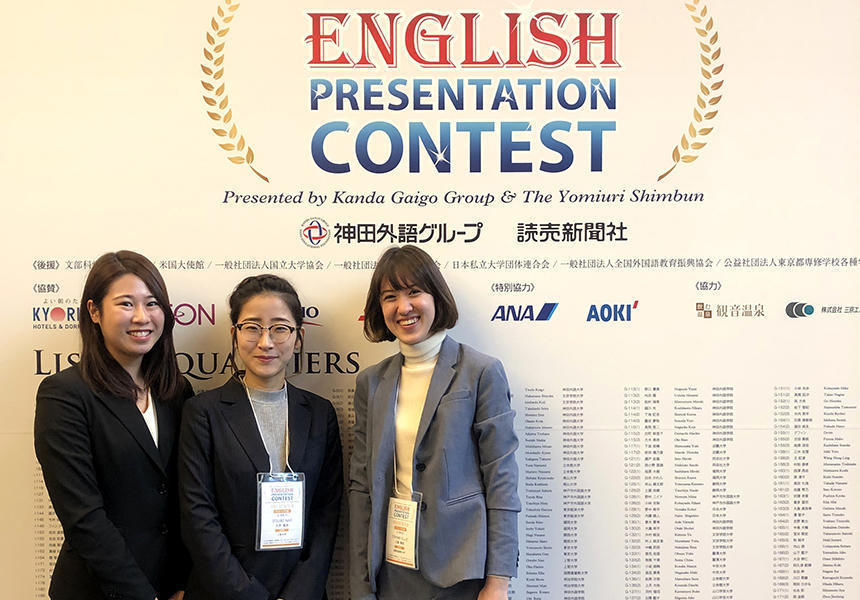NEWS
ICU student's team wins Grand Prize at the 7th Annual All Japan Student English Presentation Contest
Update: January 10, 2019
 Left: Eri Eshima
Left: Eri EshimaThe 7th Annual All Japan Student English Presentation Contest (hosts: Kanda Gaigo Group and The Yomiuri Shimbun) was held on Saturday, December 1, 2018 at the Yomiuri Otemachi Hall (Chiyoda-ward, Tokyo) and a three-student group made up of ICU's Eri Eshima (2nd year student) and two students from Sophia University won the Minister of Education, Culture, Sports, Science and Technology Award, which is the Grand Prize, and received 1 million yen as a supplementary prize.
Content of the presentation:
The contest has three themes and the one we chose is "Protect the Earth! Proposing a New Environmental Educational Program." In the presentation, we focused on the waste issue and proposed a program named "zero waste camping."
Zero waste camping is a three day camp that offers opportunities to children to think about a lifestyle that does not create waste and includes several activities incorporating environmental education. The participants are divided into groups of five and compete for eco points through the three days. Similar to a reward system, eco points are given when teams choose actions to reduce waste or engage in environmentally friendly acts.
The main activity of the zero waste camping is ecopping, which combines eco and shopping. Children need to prepare food for three days on their own and they go shopping by themselves. When buying ingredients, the aim is to minimize waste as much as possible, so they have to think to buy only necessary things and choose products without food packaging. The aim of this activity is to have the children become aware of how frequently packaging materials are used at supermarkets. In addition, the program includes the eco sports day, where the participants learn about garbage sorting by moving their bodies. On the final day, eco points are aggregated and the winning team is announced.
The strength of this program, we stressed, is that it can be held anywhere, even in a city, as far as there is a supermarket and accommodation where children can stay although it is called a camp. Further, though we say zero waste, it is not a camp that does not generate any waste. The aim of the program is for the children to realize and learn what kind of actions they should take to reduce the amount of garbage generated to zero in daily life.
We presented this idea in English as one of ways to nurture environmentally friendly, smart consumers, which is important to tackle the waste problem.
Comment from Eshima:
To be honest, we never dreamt of our group receiving the grand prize. The other two persons with whom I participated in the contest are my friends from high school days. We focused on extracurricular activities at high school and we used to talk about working on something together after joining college. That is how we found this contest and decided to participate in it at the end of summer. It took very long to arrive at a concrete theme and as the other two are going to Sophia University and I am going to ICU, we were not able to meet and discuss the contents in deep that much, and there were many instances we felt disheartened. The fact that we were able to produce results despite the limited preparation time is without doubt thanks to what we have built up from our high school days and our team strength.
Finally, one of the reporters whom we met at the interview after the contest turned out to be an ICU alumna who had also graduated from the same high school that we three went to. That unexpected encounter enabled by the contest has also become wonderful memories.
